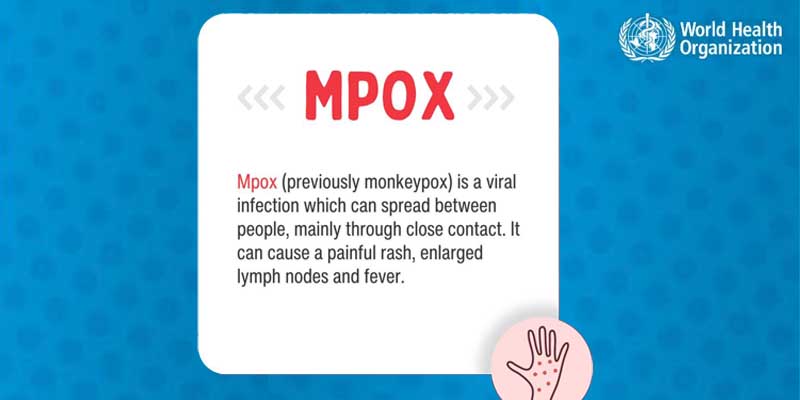- World
- Oct 05
- Kevin Savio Antony
WHO approves first mpox diagnostic test for emergency use
The World Health Organisation (WHO) announced that it has approved the first mpox diagnostic test for emergency use, which will boost diagnostic capacity in countries facing outbreaks of the disease.
Key points:
• The approval for emergency use of the Alinity m MPXV assay, manufactured by Abbott Molecular Inc, will be pivotal in expanding diagnostic capacity in countries facing mpox outbreaks.
• Alinity m MPXV assay is a real-time PCR (polymerase chain reaction) test that enables detection of monkeypox virus DNA from human skin lesion swabs.
• Over 30,000 suspected cases have been reported on the continent this year, with the highest numbers in the Democratic Republic of the Congo (DRC), Burundi, and Nigeria. Furthermore, only 37 per cent of suspected cases in DRC have been tested.
What is mpox?
• Mpox, previously known as monkeypox, is an infectious disease caused by the monkeypox virus (MPXV).
• Mpox virus belongs to the Orthopoxvirus genus in the family Poxviridae.
• The Orthopoxvirus genus also includes variola virus (which causes smallpox), vaccinia virus (used in the smallpox vaccine), and cowpox virus.
• Mpox has symptoms similar, but less severe, to smallpox. While smallpox was eradicated in 1980, mpox continues to occur in countries of central and west Africa.
• Mpox is zoonosis: a disease that is transmitted from animals to humans.
• Symptoms include painful rash, enlarged lymph nodes, fever, headache and muscle ache.
• A global outbreak first emerged in May 2022 which WHO said constituted a public health emergency of international concern (PHEIC) – the highest level of alarm under international health law.
• Africa has seen an unprecedented increase and expansion in mpox cases this year, with transmission mainly centred in the DRC. The surge is being driven by two strains of the mpox virus, or clades.
• Following rapid spread of the new virulent clade 1b strain, which has also been detected outside Africa, WHO on August 14 declared that mpox was once again a PHEIC.
• Monkeypox was first discovered in 1958 when outbreaks of a pox-like disease occurred in monkeys kept for research, hence the name ‘monkeypox’.
• The first human case was recorded in 1970 in the Democratic Republic of the Congo (then known as Zaire), and since then the infection has been reported in a number of central and western African countries. Most cases are reported from Congo and Nigeria.
• In 2003, monkeypox was recorded in the United States when an outbreak occurred following importation of rodents from Africa. Cases were reported in both humans and pet prairie dogs.
• All the human infections followed contact with an infected pet and all patients recovered.
Transmission
• Mpox does not spread easily between people.
• Spread of mpox may occur when a person comes into close contact with an animal (rodents are believed to be the primary animal reservoir for transmission to humans), human, or materials contaminated with the virus.
• The virus enters the body through broken skin (even if not visible), the respiratory tract, or the mucous membranes (eyes, nose, or mouth).
Person-to-person spread is very uncommon, but may occur through:
• Contact with clothing or linens (such as bedding or towels) used by an infected person.
• Direct contact with mpox skin lesions or scabs.
• Coughing or sneezing of an individual with a mpox rash.
Treatment
• Detection of viral DNA by polymerase chain reaction (PCR) is the preferred laboratory test for mpox.
• Mpox, in most cases, is a mild condition which will resolve on its own and have no long-term effects on a person’s health. Most people recover within a few weeks. However, severe illness can occur in some individuals.
• Treatment of mpox patients is supportive dependent on the symptoms. Various compounds that may be effective against mpox virus infection are being developed and tested.
• Prevention and control of human mpox rely on raising awareness in communities and educating health workers to prevent infection and stop transmission.
• Currently, two mpox vaccines have been approved by WHO-listed national regulatory authorities, and which its expert group on immunisations have also recommended.
(The author is a trainer for Civil Services aspirants.)


